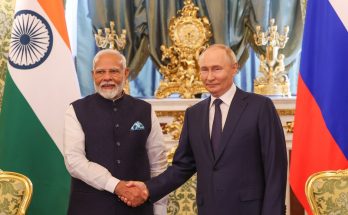
The Quad moment is finally here as the leaders of the four democracies, shedding chronic hesitations, hold their first-ever summit meeting on March 12, a defining step that is poised to make the four-letter word central to the evolving geopolitical grammar of the Indo-Pacific.
The Quad summit meeting is the culmination of the three foreign ministers-level meeting that took place in the last eighteen months, with each meeting cementing the joint resolve to scale up the Quad to the summit level.
The Quad summit has been in the making all these years, but looking back in retrospect historians will wonder what took the four major democracies such a long time to pool in their core strengths to do the obvious – to keep the region free of adventurism and hegemonism and keeping sea lanes of communication open.
China Challenge

Clearly, the China challenge or threat (depending upon how one sees it), will remain the prime mover of the Quad grouping. Addressing the China challenge had figured high in all Quad meetings so far, but the summit discussions will be of a different order as it’s probably for the first time that the leaders of the four major democracies will spend a bulk of their time discussing China. This time also, the China challenge will be high on the agenda as each Quad country has its own share of grudges and anxieties vis-à-vis China. In a recent telephonic conversation with PM Modi, Japanese PM Yoshihide Suga has already aired his specific concerns about China, including East China Sea and South China Sea. As for Joe Biden, he is proving to be quite upfront by underlining how his administration sees China as the national security threat number one.
For India, the March 12 summit of the Quad will be taking place at a time when the tensions with China have eased slightly after mutual disengagement of troops at the Pangong Lake, but the troops of the two countries remain locked in standoff at other friction points in high-altitude Ladakh region.
Moving beyond China fixation
One needn’t belabour the point that China will be the elephant in the Quad virtual room, but the real challenge for all the leaders will be to not let the elephant hijack the entire agenda. In this regard, there is some good news as new themes and subjects are being placed on the agenda, which promises to redefine and rebrand the Quad in the public imagination. In this regard, Joe Biden’s conceptual clarity about the Quad should be welcomed by the strategic community.
In a terse statement on the summit agenda, White House Press Secretary Jen Psaki has identified key issues. “A range of issues, course, we expect to be discussed, I should say, facing the global community from the threat of COVID to economic cooperation and, of course, to the climate crisis,” she said ahead of the summit.
In a separate news conference, State Department spokesperson Ned Price underlined that “the Quad is not about any single challenge.” “It’s not about any single competitor. This is an entity forged and formed because we share common interests… maritime security is, of course, an important one, but our shared interests go well beyond that.” In so far as press briefings go, these remarks are prescient as it points to the future of the Quad, which will not be just China-centric but will involve urgent considerations of all-too-real issues such as climate change and post-pandemic economic recovery.
Making Quad people-centric
This positive vision of the Quad is in alignment with the official articulation by India’s foreign-policy establishment. In a curtain-raiser press release, India’s Ministry of External Affairs said that besides the Indo-Pacific, “the Summit will provide an opportunity to exchange views on contemporary challenges such as resilient supply chains, emerging and critical technologies, maritime security, and climate change.”
Most important, the Indian statement speaks about “ongoing efforts to combat Covid-19 pandemic and explore opportunities for collaboration in ensuring safe, equitable and affordable vaccines in the Indo-Pacific region.”
With vaccine diplomacy becoming a new arena of geopolitical contestation, the Quad summit meeting will explore ways by which Quad-focused vaccine production and supply hubs can be developed. In this regard, one of the major takeaways of the Quad summit could be the setting up of Quad fund/financing mechanism to fund a significant increase in manufacturing capacity for coronavirus vaccines in India. If the vaccine plan takes off, it will provide a soft power gloss to the Quad which is largely seen as a geostrategic counterweight to China.
Much before the virtual summit takes place, the Quad has already been elevated and its agenda redefined to make this geo-strategic agenda more focused on people-centric issues rather than geostrategic calculations. With this positive focus, the Quad can only scale new heights. But for that to happen, and for the Quad to acquire the stature it deserves, it’s necessary to eschew the annoying habit of separate standalone spin, shed hesitations of history and speak in one voice. If the four major democracies sing in unison, the world is bound to listen in and take note.
Author Profile

- Manish Chand is Founder-CEO and Editor-in-Chief of India Writes Network (www.indiawrites.org) and India and World, a pioneering magazine focused on international affairs. He is CEO/Director of TGII Media Private Limited, an India-based media, publishing, research and consultancy company.
Latest entries
 India and the WorldJuly 9, 2024Defying West, India sets $100 billion trade target with Russia
India and the WorldJuly 9, 2024Defying West, India sets $100 billion trade target with Russia India and the WorldJuly 5, 2024India at SCO: Takes swipe at Pakistan for cross-border terror, pushes alternative to BRI
India and the WorldJuly 5, 2024India at SCO: Takes swipe at Pakistan for cross-border terror, pushes alternative to BRI India and the WorldJune 14, 2024Modi’s Day 1 in Italy: Bonding with Britain, France
India and the WorldJune 14, 2024Modi’s Day 1 in Italy: Bonding with Britain, France India and the WorldJune 13, 2024G7 summit in Italy: Modi to showcase India as leader of Global South
India and the WorldJune 13, 2024G7 summit in Italy: Modi to showcase India as leader of Global South






